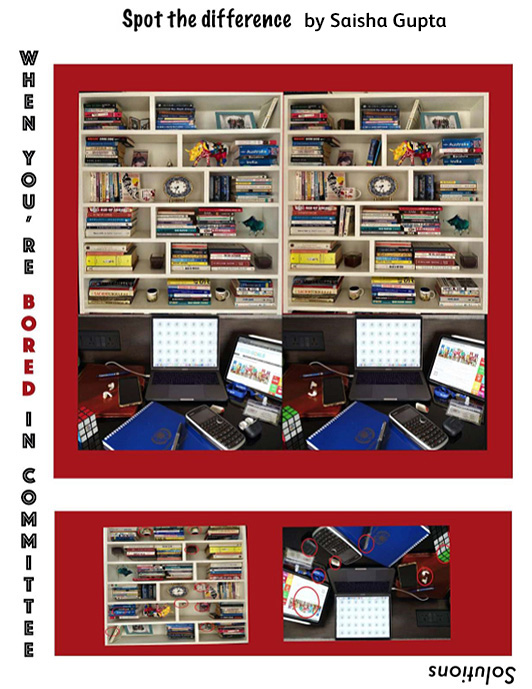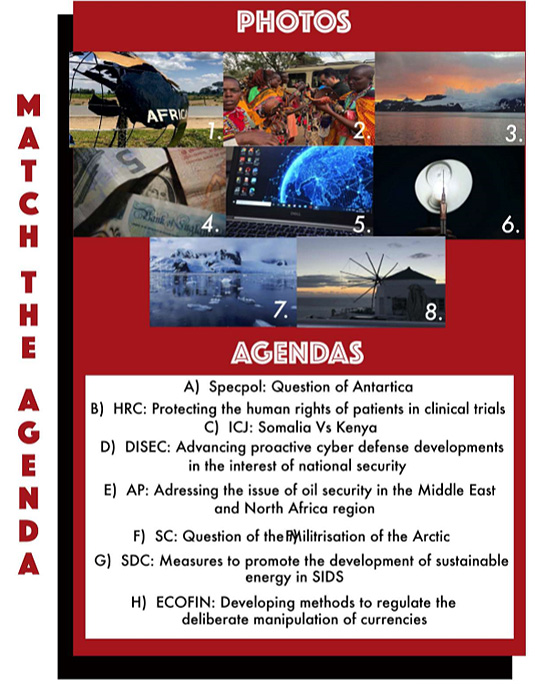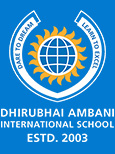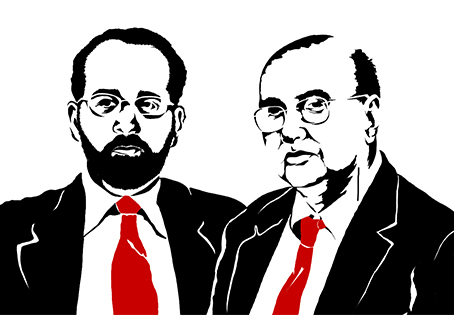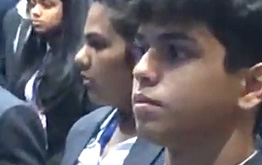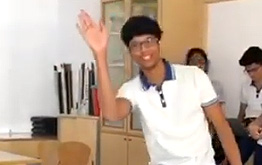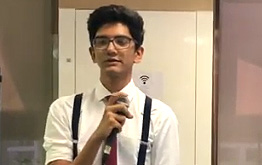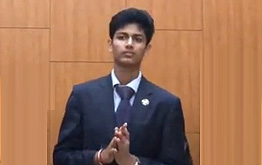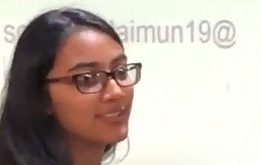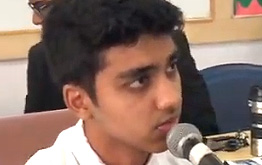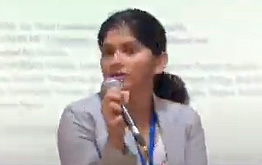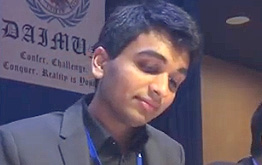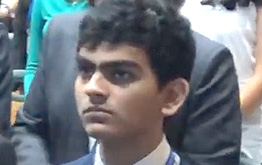Daimun Newsletter
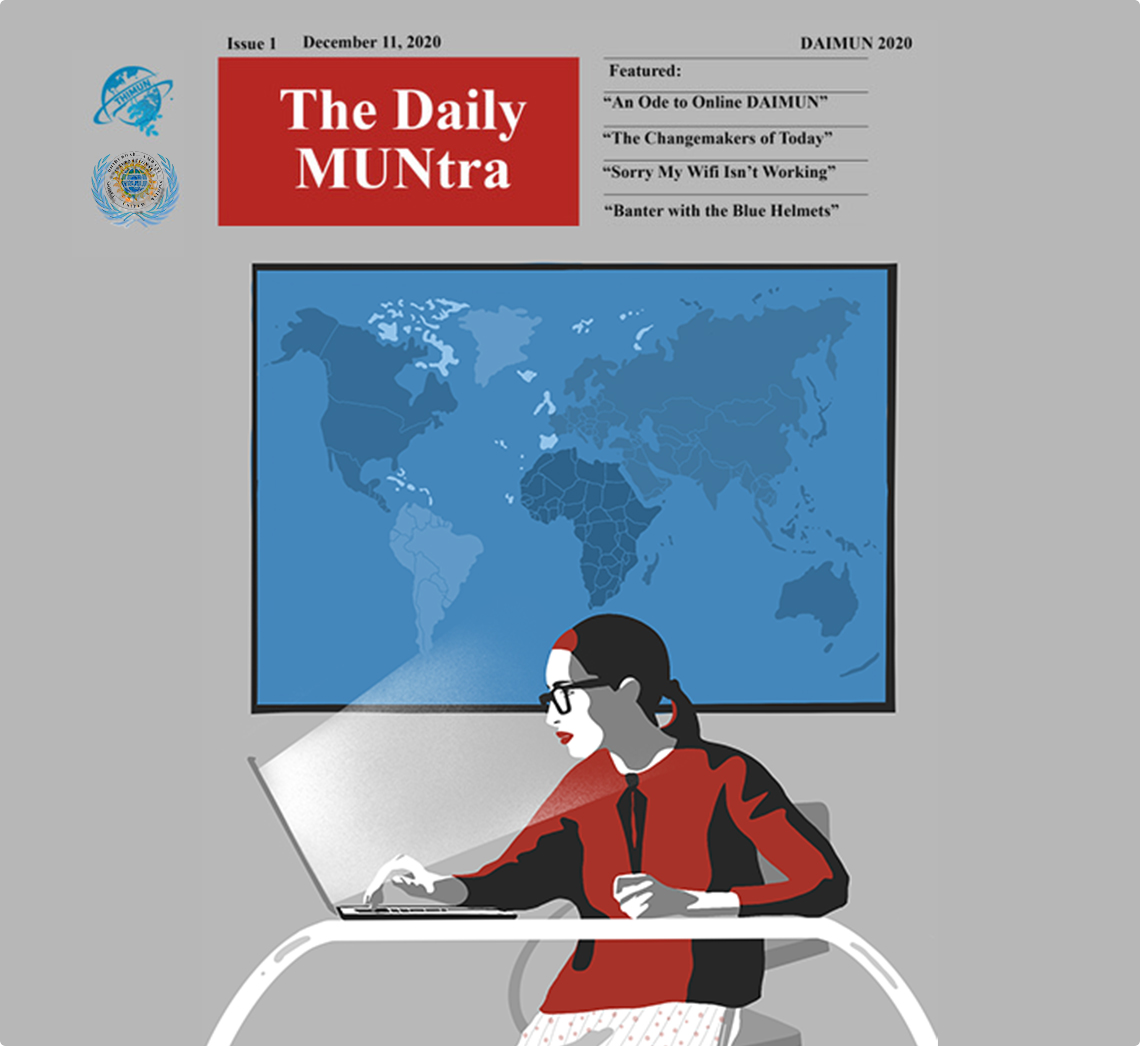

The Opening Ceremony By Jash Bhatia, DAIS
The President of the General Assembly, Sahil Rane, welcomed the 290 delegates from over 13 schools around the world to the first ever Online DAIMUN 2020 Conference. He introduced the committees at DAIMUN 2020– with the mention of an incredibly professional International Court of Justice experience and the newly introduced Advisory Panel on the Question of Middle East and North Africa. The delegates were then addressed by the Secretary-General of DAIMUN 2020, Dhruva Sankhe. In his speech, he discussed his experiences on his Model United Nations journey, culminating at DAIMUN 2020.
The first panelist at the opening ceremony was Mr Ashok Malik, the policy advisor and additional secretary to the Ministry of External Affairs and the Foreign Minister of India.
Having once held the office of Press Secretary to the President of India, he is well versed with the impact of the media and social elements on global politics and international cooperation. Discussing the effects of social media in the times of the pandemic and an increasingly digitised world, Mr Malik cited the breaking down of communication barriers as a factor in globalisation and escalating collaborative efforts among the international community. Answering questions from delegates, he expounded upon the two-dimensional nature of social media – bringing coalitions of citizens to the forefront of change, as well as bringing about an instant response from policy makers.
The second guest speaker was Mr Rakesh Sood, an ex-ambassador for India to the Conference on Disarmament at the United Nations in Geneva and the UN Secretary General’s Disarmament Advisory Board, among other global forums. With over 40 years of experience in the fields of foreign affairs, diplomacy and international security, he is an expert on political relations between countries. He captivated the delegates’ attention by tracing the roots of multilateralism to the failure of the League of Nations and later, the establishment of the United Nations. Mr Sood spoke about realism and the selfish interest of nations, and how international cooperation was induced by overcoming these hurdles. Despite the rivalries between international powers, there were several shared goals which were crucial to the international community, which led to the reform in the UN. Member nations pushing for the implementation of resolutions passed by an unbiased international body was imperative for its success, according to Mr Sood.
The strong message propounded by our noteworthy panelists and their futuristic solutions to looming global issues invigorated all the delegates present on the virtual platform. The Secretary General declared the DAIMUN 2020 Conference open. The coming days promise to find solutions to the polarization problems in the global domain; to collaborate on an equal international playing field and to debate on creating fair geo-political contours of the world.
"Multilateralism means that countries as sovereign bodies agree to give up part of that sovereignty to the collective authority for a common benefit." ~Ambassador Rakesh Sood
"In a globalised world, you must demand reciprocity from other nations. Although India has gained from globalisation, sometimes it has allowed access without reciprocity." ~Mr. Ashok Malik
Introducing Polly the Polar Bear… By Ananya Goenka, DAIS
Polly the Polar Bear is the official mascot of DAIMUN 2020 and she undoubtedly embodies this year’s theme of collaborating in a multiPOLAR world.

Illustration by - Paree Rohera, DAIS
Indomitable yet comforting, Polly personifies the modern paradigm of collaboration. She represents the strength in collaboration but is also plagued with worries of the lack thereof. Polly herself faces the bitter winter of extinction as the threat of climate change looms. Along with the deteriorating environment, Polly worries about the increasing strife and non-cooperation between countries. She worries that in a world battling the manacles of coronavirus, countries are feuding at a time when collaboration is paramount. And sadly Polly’s worries are warranted. Trade protectionism, neo-colonialism and unsustainable practices, all spell doom for collaboration.
But there still does exist kairos. Polly’s courage and determination promise hope. Hopes of reconciliation, sustainability and collaboration. Polly is much more than just our mascot, Polly is a representative of a brighter future, of the youth, of DAIMUN. Polly is fearless and hopeful. Polly is brave and wise. Polly has the power to galvanise change, and so do you.
The Advisory Panel and the Middle East Crisis: Productivity at its Finest By Naviya Gupta
The Middle East: the land of camels and carpets; the land of Sultans with intricate turbans laced with flamboyant jewels; the land of magic and stories and a history of gold.
Today’s Middle East is a complete volte-face from those fantastical visions. Civil wars, desertification, an endless struggle over the precious oil reserves that lie below the grainy soils. A fragile economy, already cracking at the edges, centred around the world’s most precious resource: oil.
The Advisory Panel, armed with detailed resolutions and opinionated voices, seeks to tackle these issues through collaboration and a common opinion. To quote the chair, Vasav Jain, “It is a committee marked with energetic debate, precise paperwork and diplomatic stances to answer the most pressing questions, which define the future of the Middle East and North Africa.”
With roll call and procedure, the committee commenced. There are repeated implorations to switch cameras on. And a reluctant minute later, 15 delegates appear on the screen with uniform blue backgrounds.
A hubbub of voices was heard...
"We would try to be as productive as possible, as the AP is a productive Committee,” says the Deputy Chair, Treya Agarwal, “We aren’t very rigid with procedure. We love passionate people and those who think outside the box."
"Stabilizing the oil market is of EXTREME importance to Algeria. Algeria calls upon the Advisory Panel to draw its attention to the fluctuating oil prices," states the delegate of Algeria, Aaryan Jagtap, hurriedly trying to wrap up the speech.
"We must innovatively influence demand and supply. Let us come together and create a part of prosperity for ALL oil trading nations," passionately pontificates the delegate of Egypt, Kavan Shah.
"In the light of the COVID-19 pandemic, there have been drastic reductions in the price of oil," says the delegate of Iraq Sanishka Shah, morosely.
Drought in the Nile? Arab Spring uprisings? Worldwide oil wars? The Advisory Panel answers them all with fervor as we get a sneak peak into the troubled multipolar world of the Middle East. Here, delegations strive to collaborate while people die of thirst, hunger, genocide and poverty back at their war stricken nations.
International Courts: Boundaries to Overcome By Samika Jain
The infamous Ukraine v/s Russia spat in February of 2014 triggered what has come to be known as the “greatest security crisis in Europe since the Cold War.” As the President of the IC, Insha Lakhani, stated, “it is a prime example of possible amplified misrepresentation of justice in the hands of the powerful.”
The advocates of Ukraine, Anushree Mishra and Akanksha Pai, think it is a powerful agenda as it allows them to see whether justice would really be delivered in cases of conflict between stronger states like Russia and states like Ukraine. “We believe that Russia has committed blatant violations of the ICERD and ICSFT. It has used the veto power to its benefit to stop an investigation in the case of MH17. This will not be tolerated.”
The conflict over the region of Donbas largely revolves around alleged hegemonic Russian support to the separatist forces in Donbas. The dispute in Crimea is, to a large extent, also a humanitarian crisis. However, we should note the deteriorating human rights in Russia and the unrest and pro-Russian riots in Ukraine. Ukraine claims that Russia had used ambiguous and lucid methods to brew trouble and deal damage to Ukraine and it’s citizens.
Fifteen minutes before the start of the committee, Judge Param Davda is enveloped in an air of confidence albeit the fact that this is his first time presiding in the International Court of Justice. As the committee commenced, Judge Desai was the first to emphatically rate the piece of evidence, regarding Russia’s actions in Ukraine, stringently dismissing it as “wordplay” and “unratified information.” Judge Davda, in quick retaliation, demanded proof that the reporters weren’t “Pro-Russian.”
The mystery deepened as the biases were weighed out while the judges dug deeper into the case. What will they find? What hidden evidence will they uncover? What will the verdict be? Only time will tell.
My WIFI wasn’t working and 6 other lies you can tell your Chairs By Kamya Parekh
If you need a hand in getting out of committee either because of boredom or due to some "unforeseeable internet issues", don't worry we have got your back. Here is this exclusive guide to making sure you win that best delegate award while putting in the minimal effort.
- When it’s the time to (finally) give a speech about your resolution:
*Make fake disturbances and static noises (crumpling paper is quite effective) with your video off and do your best impression of Darth Vader*
- When a delegate asks you a POI that you have no idea how to answer:
“I’m so sorry I can’t hear you because your voice cracked; can you please say that again?”
*Repeat until the delegate gets annoyed and gives up on asking the question.*
If they’re really persistent, just play ‘statue’ for a little bit and leave the meeting because... “WIFI issues.” ;)
- When you take a long nap, and wake up to the Chair– who seems to talking in a different language– and you’ve missed out on all the important instructions:
“Umm... so my screen froze for a little bit. Can you please repeat everything you’ve said in the past two hours?” (Experts advise you not to play this card more than once. Use it wisely.)
- When you couldn’t submit your resolution on time because you were too busy with last minute edits and making it ‘perfect’ (well, according to you anyway):
“Huh? What? No, I emailed it to you? Can you please check again? Oh, are you sure you didn’t receive it? Would you like me to resend it? Okay yeah, I can do that right now. No problem.” *Make sure to put on your best Concerned Face™ *
- When the Chair says, “I trust all the delegates are in formal attire!”:
*Smile confidently without looking down at your bright pink Peppa Pig pajamas*
“Yes, obviously.” (Do not, under any circumstances, stand up without turning your camera off.)
- When the Chair says, “Delegate, please switch on your camera.”:
“Oh, my camera IS on. You can’t see me? Really? Would you like me to leave and rejoin? I think there’s something wrong…”
*Leave the meeting*
*Frantically shove all the Pringles into your mouth*
*Rejoin, switch on your camera and carry on like nothing happened.*
- When the Chair asks for sources after you put forward some “facts” that support your resolution:
*Sneakily edit the Wikipedia page.*
“What do you mean it’s not a trustworthy source? Of course it’s reliable. See? It says right here! Trump won this election. Also, I have no idea why it says edited 5 minutes ago.”
There you go… you are ready now!
An Ode to Online DAIMUN 2020 By Kashvee Barjatya
March 2020: A turbulent time.
Will DAIMUN see light again?
My thoughts, only with you
India wants to know.
But rise, in Microsoft glory, you did.
From the ashes of burnt resolutions
Resurrected to give me December days of hope
And participation certificates.
My love for you, unchecked
Like the behaviour of your delegates
“mY wIFi iSn’t wOrKiNG” chanted
More melodiously than any tiktok reels sound.
We have a stronger connection, you and I
Than the internet of your admin members
Sima from Mumbai, beware
Microsoft Teams hot on your trail.
“Delegate, what is this behaviour?
I’m sorry, I left by mistake.”
The red button calls to me
Bright as the Press Team’s future
Yet I persevere.
(College apps, hmu)
In motions of entertainment, you excel
It distracts from the MUNdane of Instagram
“Give me Best delegate!
I know 23 tik tok dances!”
But I am swallowed by my useless background.
I care about you- I really do
But I won’t turn my camera on.
Yet how I longed to give TED talks
To alphabets and profile pictures
And hear these sweet sounds:
“Delegates Decorum!
Sit down, I can see your penguin pants.
Unbecoming taste, Delegate of DPRK
Private chats with the US?”
“I didn’t research the agenda- but can I Wefast you dalgona coffee?”
Stop appearing away on Teams
Online DAIMUN, do you notice me?
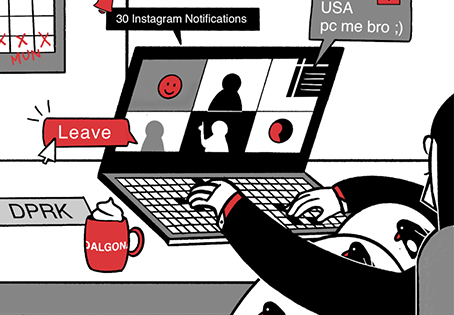
Illustration by - Tridha Haritwal, DAIS
Banter with A Blue-Helmet By Jacintha Thota
This week, we spoke with a member of the United Nations’ Peacekeeping Force. Here is an excerpt of our fictitious conversation.
Q: Tell us something about being a part of an organization like the UN.
A: The United Nations is a behemoth, and we at the UNPKF are the ground men, carrying forward the ideals discussed in Geneva, New York and Copenhagen. What amazes me is the consistency of values that are maintained throughout the organization– regardless of which tier one considers, the UN maintains baffling amounts of oppressive hierarchy and inequality. Right from the disproportionate bias given to the P5, to the new layers of dichotomy we spread between fellow blue helmets and locals everyday, the dedication to western supremacy and neo-colonialism is to be admired.
Q: Where are most of the peacekeeping troops from?
A: Bearing in mind the aforementioned western hierarchical values, it should come as no surprise that most of us come from developing countries – India, Bangladesh, Rwanda – and are dictated by the USA, UK, and France, who do little more than bark orders or attend Press conferences. The wealthy commanding the poor, those at the top profiting from the toiling of the bottom - it's not as if we have never seen that before. Well, in the spirit of candor, we are merely upholding centuries-old power structures well enough to make English Medieval kings turn in their graves with pride.
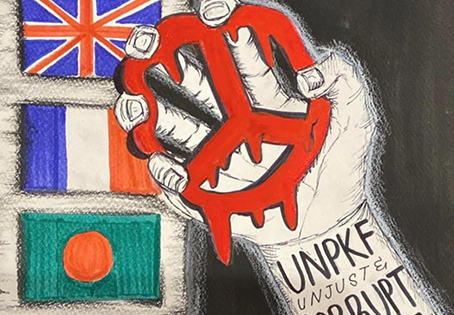
Illustration by Pranaaya Jhaveri DAIS
Q: How long do peacekeeping operations usually last?
A: When an on-ground operation ends, it is contingent upon the extent of conflict. Usually, we stay until the point where no lasting change has been made but we’ve exhausted the operation’s budget, or until there’s enough heart-warming pictures for the Press and infographics for the UN webpage. Or of course, until the locals protest to make us leave.
Sometimes, however– like in the case of Darfur– we refuse to end the mission, even if we know it is futile just to provide the public with a few more Press-worthy moments, because after all, what is a UNPKF operation without a little bit of publicity. In hindsight, perhaps a reassessment of strategy was warranted, but maintaining the guise of UN authority and control is irrefutably more important than actually restoring peace to the area.
Q: Lastly, What is the most satisfying part of your job?
A: Undoubtedly, facilitating lasting change in conflicted regions. This is usually done by making the communities even more volatile, aid-dependant, and vulnerable. It is heart-warming to know that our impact is so profound, that these communities have to spend years undoing the damage we’ve caused by imposing Eurocentric notions of development on them. It only goes to prove how steadfastly we hold onto our fundamental values: why would we ever realign our approach to peacekeeping?
Next week, we parlay with a fictitious member of the Klu Klux Klan for their insight on human rights. Stay tuned!
Project G20 By Sanaa Beriwala
Is the G20 really committed to resolving global-concerns, or is it merely just a talkfest of twenty leaders, full of chatter, contention and no show? Initial excitement of collaborating, flooding ideas and hope of achievements can evaporate when team-members invariably sacrifice global-cooperation for personal benefits much like a school team-project. Remaining are those who are happy to piggyback, and those who genuinely try their level-best to contribute, and earn a grade by merit Though strange, the similarities between the G20 leaders and a classroom dynamic are undeniable.
Let’s start off with the troublemaking-jocks or more colloquially known as BIG BULLY. One look at the USA's actions on certain international agreements and the homogeneity is irrefutable. Under the guise of being a “legend” as presupposed by their very own cheerleaders Saudi Arabia and Israel. Trump decided the perfect time to play golf was during the summit. Reputation is of utmost importance, and when the USA felt their position as the world’s largest economy was threatened by the Paris Agreement, they instantly resisted it, oblivious to the assigned project, or the global environmental-crisis. Whether it’s a school bully or the global one, they aim at safeguarding their interests first. And the moment other team-members start to express reservations, they withdraw their teamwork unflinchingly to massage their bruised egos.
And of course, every classroom needs its NERDS. What would the G20 Project be without teacher’s pets like India and Japan, who are genuinely invested in making the project successful to receive merit? They’ve made their commitment to the G20’s action no secret by aggressively addressing global-concerns like providing alternative energy-sources.
The ‘eager to impress’ you can say. At the 2020 Summit, India made four elements very clear, the creation of a talent pool, accessible technology, transparency in governance and conservation of the Earth. And despite personal desires like how India wanted to host the summit in 2022, the year of their 75th anniversary, they displayed no inconvenience or conflict towards Indonesia occupying that spot, despite a year after year delay.
G20 like most schools also has OUTCASTS; purposefully excluded from all collaboration, because they don’t make the ‘cut’. G20 remains critiqued for not including developing nations or deserving leaders in its charter. They’ve made ample proposals for a new-system of economic cooperation preventing any growth-imbalance in world-economy. However, all attempts to come up with an utopic measure to appease everyone is futile, since personal-interests clash with global-ones.
So every new-year, another project commences, and leaders of the world’s 20 largest economies meet and highlight global issues and discuss solutions. But more than cooperation, conflict arises with rare solutions.
If only the G20 leaders could revisit their school days and master the art of balancing teamwork…
Final Grade awarded: A* for effort but an F for achievement.
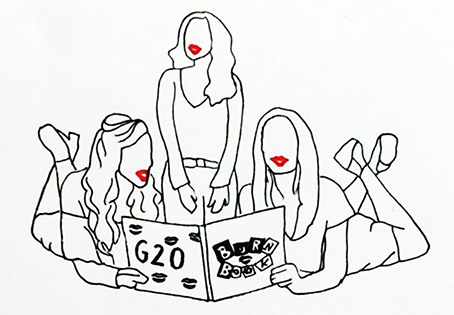
Illustration by Nandini Pradeep, DAIS
France vs. China: the question of 20 million dollars and absentee delegates
By Kamya Parekh
The only correct way to describe the Human Rights Council in their first committee session is complete and utter chaos. The pandemonium that occurs in the physical world during lobbying sessions has somehow transpired into this virtual meeting too. With the Chairs frantically trying to give out instructions amid the delegates’ repetitive interruptions and everyone impatiently waiting to go discuss their resolutions, the HRC began on a note of eager anticipation.
As soon as the President, Adit Kadakia, uttered the words, “You may start lobbying” (the joy on his face was evident, perhaps because he was finally getting a break from these errant delegates), everybody disappeared from the meeting in a matter of seconds to join their respective blocs. The largest bloc in the committee, consisting of almost all the delegates, was almost instantly in a fervent argument about one of the clauses of their resolution on ‘protecting the human rights of patients in clinical trials’ by the time this press correspondent managed to track them down. The delegate of Canada, Tanay Pachasia, was furiously questioning the delegate of France, Yash Tulsian, about the mention of a requirement of 20 million US dollars in the resolution. He wanted to know if France had “put in any logical or mathematical thought into the figure? Or just popped up with 20 million?” France retorted by saying that if he was just “popping up” with random numbers, he wouldn’t be sitting there. The delegate of India, Aaryan Kushwah, piped in and started grilling the delegate of France, demanding a complete break-down of how exactly such a large sum of money is going to be spent. France, unable to provide such an explanation, instead declared that ‘at least his resolution was better than China’s.’ This seemed to pacify the delegate of India, who agreed that “China’s resolution was out of the equation.”
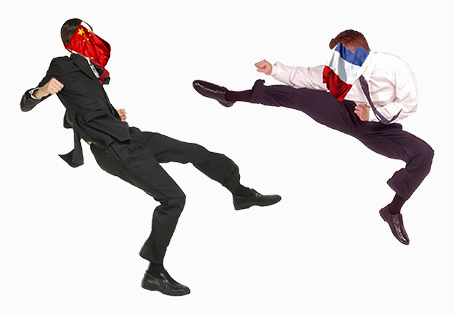
Illustration by Paree Rohera, DAIS
The delegate of China, who chose to maintain anonymity, declined our request to be interviewed. Before the delegates could say anything further, the President proclaimed that the lobbying session was over and requested everybody to return to the session. Reluctantly, the delegates left the blocs, with France yelling, “Please vote for my resolution!” before a prompt, almost magical teleportation back to committee.
The formal session of HRC began with a disorderly roll-call and the Deputy President, Dev Mehta, noting the absence of the Delegate of China (Delegate of China? China? Can you hear us?). Midway through instructions about the procedure, the absentee delegate, who seems to have a penchant for the dramatic, made a fashionably late entrance, announced his presence and opened with a speech about his resolution. Throughout his speech, he talked about the “importance of transparency” (a little hypocritical, no?) and received judgemental looks from the rest of the committee. China went on to make the grave mistake of yielding his time to POIs and was rapidly bombarded with questions about his country’s ‘transparency’ with the COVID-19 cases. Undoubtedly, there could not have been a better time for a break.
DISEC Bloc Party By Nandini Krishnamoorthy
[12:33] om787legend (Guest): join the delegate of Iran’s bloc...
This is the first, rather ominous, notification this press delegate received from the channel discussing the advancement of proactive cyber defense developments. The delegate of the United Kingdom, Om Chakravarty Rajkumar, soon followed this wholehearted endorsal of Iran, Aadarsh Agarwal, with allegations that “USA’s cyber security laws are outdated and they are not willing to change”, and a final:
[12:34] om787legend (Guest): we support the gdpr and learn from it...
The committee had begun with an explanation of all the complicated procedures to be followed during the conference, but the Chairs soon sent the delegates off into separate channels with instructions to ‘Join the channel with the agenda you have researched the most about’. Upon being set loose to discuss their resolutions in the different channels, the once confident and poised delegates had about them the air of helpless baby chicks in search of their mother.
Specifically in the channel to discuss the advancement of proactive cyber defense developments, the delegates were particularly conflicted. The three previously created blocs each had a resolution they aimed to work on and get approved. The delegate of Iran, however, had a suggestion that threw the others for a loop – that they should ignore the previously-formed blocs and merge together to work on a resolution that is the very best it can be. However, by the time this press reporter had finished peeking in on the other channels and returned to this one, they had mysteriously abandoned this plan.
Each bloc now had a resolution they were enthusiastically working on: the delegates of South Africa, Anishka Manawat, and that of the Philippines, Viraj Aggarwal intended to focus on having a higher number of ethical hackers as well as cooperation between the public, while the delegate of Brazil, Vivek Ramesh, was a one-man army, hotly explaining and arguing for his resolution that called for the rehabilitation of cyber-criminals in prison. This rehabilitation would include a strict routine and community service work, as well as the training of the prisoners in new skills so as to make them aware of their career options, steering them away from cyber-crime.
The delegate of Iran, having given up on the idea of unity, was now furiously working on a resolution of his own. He wants to set up a national cyber defence programme which would be overlooked by the Cyber Security Implementation Council as an ad hoc to the DISEC committee. In addition to this, he also aims to establish a response mechanism for each country to react in case of a cyber attack, and drive home the need for every country to develop technologies such as artificial intelligence, quantum computing and supply chain hacking to defend their national security interest from hackers.
Just before the committee was suspended for the lunch break, the delegate of Israel, Benedetta Vincioni came in and demanded to hear a summary of all the resolutions. Upon hearing what everyone had to say, she made the abrupt decision to sign the delegate of Brazil’s resolution. This ability to make decisions on the fly was thoroughly confusing to all the other delegates, but ultimately invaluable in a conference as fast-paced as today’s session was.
The Changemakers of Today By Sanaa Beriwala
“Rather than standing or speaking for children, we need to stand with children speaking for themselves. We don’t need a political movement for children… we need to empower their movements, by building environments and policies for our collective future.”
— Sandra Meucci
For some it’s climate change, for others it’s gun violence or racial discrimination, or mental health, no matter the global issue, it is the youth-activists that highlight societal crises globally. Youth have been synonymous in leading important movements and playing catalysts for bringing about change or awareness throughout history, be it the latest hashtag trend, or mass gatherings of protestors engaging in socio-political matters. They have proved that you’re never too young to make a difference and have your voice heard.
Swedish teenager, Greta Thunberg, is a 16-year old climate activist who initiated a wildfire of climate-change protests. Greta was elected a potential candidate for the Nobel Peace Prize as she successfully elevated her campaign against climate change. Thousands of young people from over 270 towns and cities were inspired by Greta’s commitment to bring the growing issue of climate change to the attention of world leaders. As Kurt Cobbain once said, with their strict moral code, “it’s the duty of the youth to challenge corruption”.
Malala Yousafzai once said ‘I raise up my voice – not so that I can shout, but so that those without a voice can be heard.” Malala, the youngest recipient of the Nobel Peace Prize, is a staunch activist for women’s education. She asserts that education is a basic human right. She's another fine example of courage and passion that allowed her to stand up against the Taliban over the right for women’s education.
The Parkland-shooting survivors have highlighted their cause for gun control. The student activists, namely Sarah Chadwick, Cameron Kasky, Delaney Tarr, David Hogg, amongst others were nominated as runner-ups for Time Magazine’s Person of the Year Award in 2018. These students organized rallies, unified the entire nation, put up a strong and defensive front, while simultaneously making convincing and emotive speeches and generated the largest movement against gun-violence that the world has ever seen. An estimated 1,000,000 students and 3,000 official silent vigils or school walk-outs were conducted alongside 800 major ‘March for Our Lives’ demonstrations. They travelled through the country, prompted youth-activism, encouraged voter-registration and achieved the highest midterm election in a quarter-century and garnering support from celebrities and politicians such as former President Barack Obama.
Jessica Taft, a leading scholar on youth activism, strongly suggests that the youth should be encouraged to participate in socio-political engagement. Young activists throughout history have helped reform the education in Chile, and won rights for the working youth in Bolivia.
However, there are always short-sighted grown-ups who will argue that activism is strictly for adults. That is somewhat agreeable as children should be relieved of their roles as activists and be allowed to savour their childhood. Politics is truly an adult dillinquished concept, and with more effective action from world leaders children may not have to take on activism.
Nonetheless, the exclusion of children from political engagement is impossible, as they grow up in the real world, facing real situations, a natural desire for change is shaped and begin working towards what they believe betters THEIR future. The only way to allow them to be real leaders is to allow them to be part of the decision making process rather than giving them directions to follow. Having the youth actively participating in political or social injustice movements, generates a diverse range of perspectives that adults may have been oblivious to.
The common underlying quality in all youth activists is the burning desire to make a change in the world they live in. Their commitment to bring forth issues that adults in a government sometimes tend to neglect or overlook is truly remarkable. Their zeal at creating awareness on pressing global issues that affect their present and future is noteworthy and their cause at being heard definitely deserves a patient ear.
Never doubt that a small group of committed, fearless, articulate and resolute citizens can change the world, no matter what their age.
And delegates, that is our expectation from you.
The DAIMUN '20 Yearbook
The horrors and wonders of the digital world By Aamanya Sejpal
The digital world has opened up pathways that once seemed impossible. With one click, you can buy a plane ticket that will take you around the globe, look at pictures of places you’ve never been to, search up any topic from nursery rhymes to quantum physics, and get thousands of results. A mere fifty years ago, this was unimaginable. Access to the internet is now a necessity, something as fundamental as a human right. But so many low-income countries do not have access to the digital world and are not a part of its revolution. The digital world is vital to global progress, and until every person from Africa to Australia has access to it, humanity cannot collectively move forward.
The internet is a wondrous place. It not only gives us information but allows us to connect with friends and family from all over the world. The pandemic has made us value this. Video calls and Zoom conferences have become essential to all our lives. And what about all our online education tools? Websites, simulations, and even tutorial videos have been our saving grace in these times. Without this, our education would have come to a standstill for the better part of a year. Moreover, information about COVID-19– statistics, how to stay safe, prescriptive precautions– are accessible via the internet. In its own way, the internet played a huge role in keeping us safe during the pandemic.
But what about people who are not as fortunate? The digital divide between high-income countries and low-income countries is massive. As SpaceX prepares to send a mission to Mars, a mere 7% of people in Sub-Saharan Africa have access to a basic internet connection. The Maldives, for example, known for its seas and beautiful landscapes, faces a problem with digitalization because it is still a developing country. Due to its spread of islands and low population density, it is difficult to provide the necessary equipment and infrastructure required. It isn’t just Maldives and Africa, hundreds of islands, villages, and towns all over the world suffer from this.
But that is not all. There are more significant problems than simply a lack of infrastructure. Even if the necessary tools were available, the people need to know how to utilise it and how to make the most of it. Resources such as teachers, translators, and even manuals are required. English is not always known by everyone, especially in developing countries. The language of the internet is primarily English, despite various translation tools. These hurdles are difficult to overcome, but without access to the digital world, low-income countries will not stay at par with the rapidly developing world.
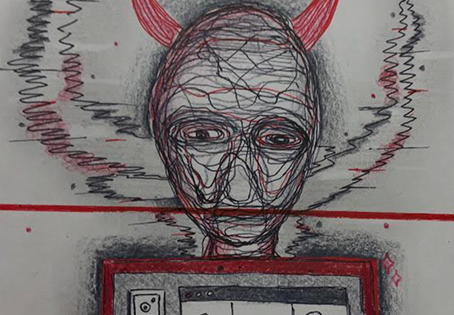
Illustration by Raena Shah, DAIS
Yet, the internet has a dark side, and as more and more people gain access to the internet, it has become easier to become a victim of cyberbullying and trolling. Exposure to various kinds of social media can lead to low self-esteem, and even to disorders such as anxiety and depression, as a study from the Industrial Psychiatry Journal proved. And not to forget, the internet is as addictive as it is attractive. It can be detrimental to your focus and state of mind.
The internet comes with its fair share of cons that cannot — and should not — be ignored. But it is important to remember that the internet exists to provide. It gives us everything — before the internet, people had to rely on archaic methods like looking for information in books and libraries instead of Googling the answer. The internet is not fundamentally good or bad, instead it is a medium for communication and collaboration. It all depends on how one chooses to use it.
The digital world has accelerated progress by leaps and bounds, providing the world with easier, faster ways to do everything.
But not all countries have grown at the same rate. Developing countries are often left behind, barred by a lack of digital literacy and infrastructure. This divide prevents children from a higher-quality of education, parents from providing for their families, and ensures that low-income countries do not get the same opportunities as high-income ones. Access to the digital world is something everyone deserves — as the Internet Society boldly declares, “The Internet is for everyone.”
It is now our job to get it to them.
China’s Selective Concern for Human Rights By Trisha Karmakar
In China, the constitution is just a piece of paper. While China criticizes the United States for its racism against African-Americans, it ignores the deep-rooted weeds in its own backyard. The Chinese Communist Party (CCP), by definition, is supposed to be egalitarian, claiming "zero-tolerance" for discrimination. However, the ruthless persecution of Uighur Muslims in Xinjiang, Africans in Guangzhou, Hong Kong protesters and Tibetans, says otherwise.
China seems to be a depiction of the Orwellian dystopia. In the land of censorship, the media is state-controlled, freedom of speech is non-existent and surveillance of its citizens, pervasive. According to a survey by the Committee to Protect Journalists, in 2019, China arrested more journalists than any other country in the world. Teachers, journalists and writers routinely 'disappear' for expressing a 'wrong' opinion.
Chinese citizens are left mostly unaware of the happenings outside of mainland China. The CCP promotes this ignorance and paints racism and discrimination as a problem of the West. However, the facts beg to differ. In the last five decades, China has seen some of the grossest violations of human rights and discrimination in the world. For example, the controversial One-Child Policy, which led to mass female infanticide and skewing of the Sex Ratio. Or the racism against Africans in Guangzhou city- who were forcibly tested for COVID-19, evicted from homes and refused entry in hospitals and hotels, in an echo of apartheid South Africa. But authorities deny this rather obvious and unconcealed racist action.
Approximately 150,000 refugees have fled Tibet due to China's expansionist policies. Meanwhile, Tibet's natural resources are exploited to fuel the Chinese industrial juggernaut. Peaceful protests are repressed with severe violence. In the past decade, 154 Tibetans have set themselves on fire to protest Chinese occupancy in Tibet. Yet, authorities continue to arbitrarily arrest, imprison and torture Tibetans. In Buddhist centres, thousands of monks have been evicted and forced into detention centres for ‘political re-education’ where they faced mental, physical and sexual abuse.
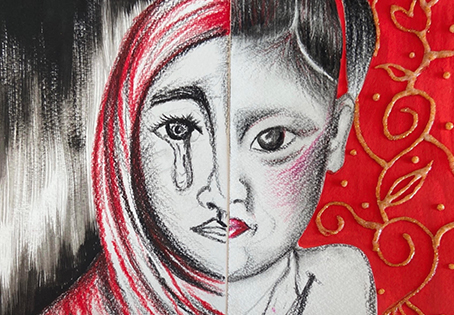
Illustration by Pranaya Jhaveri, DAIS
In Hong Kong, the brutal crackdown on citizens and journalists protesting the extradition bill is a case study on how to convert a throbbing financial centre into a totalitarian zone. The bill undermined Hong Kong's sovereignty by exposing citizens to mainland China's legal system. While millions of peaceful protesters were tear-gassed, shot with rubber bullets and detained by the police, the puppet media villainizes them as separatists and terrorists.
In Xinjiang, Chinese authorities deny the genocide of Uighur Muslims. They claim that "no such thing" is occurring. China's 'Strike Hard Campaign Against Violent Terrorism' targets Uighur Muslims and violates six international treaties, plus China's constitution. China has made a concerted effort to dilute all traces of Uighur culture through the suppression of religious freedom and forced assimilation.
Muslims are prohibited from performing traditional religious rites and wearing hijabs. Uighur children are prevented from learning about their own culture and are forced to receive state-mandated education.
China is summarily and indefinitely detaining Uighur individuals without due process, a flagrant violation of human rights. The systematic separation of families is also evident, with children being placed in orphanages when their parents are detained in concentration camps.
The CCP argues that these so-called ‘re-education camps’ are meant for vocational training. It claims that these camps rehabilitate those rejecting the Chinese language or those influenced by ‘religious extremism’. These camps supposedly help ‘trainees’ acquire education and employment opportunities. The purpose of the initiative is to allegedly eradicate ‘religious extremists’ and hence safeguard social stability in Xinjiang. However, the truth is, these camps are not ‘vocational training camps’, but concentration camps with deplorable conditions. And, the only thing they are succeeding in eradicating are innocent Uighur Muslims.
Every individual deserves dignity and basic human rights irrespective of race, class or religion. History has shown that any regime that systematically persecutes its people, perishes. Therefore for its own good, China must restore basic human rights of its citizens, in general, and Uighurs, in particular. This will not only lift China’s credentials in the eyes of the international community, but could help in the nation’s economic growth by harnessing the productivity of all its citizens.
In diplomacy, blatant and relentless hypocrisy is a sure way to lose credibility. China is only selectively concerned about human rights and violations of international treaties. China's continued disregard for civil and human rights and persecution of ethnic minorities will eventually reduce its power in this increasingly multipolar world. Ultimately, countries, businesses and investors vote with their feet, even in undemocratic countries. It won’t be long for China before the proverbial chickens come home to roost.
